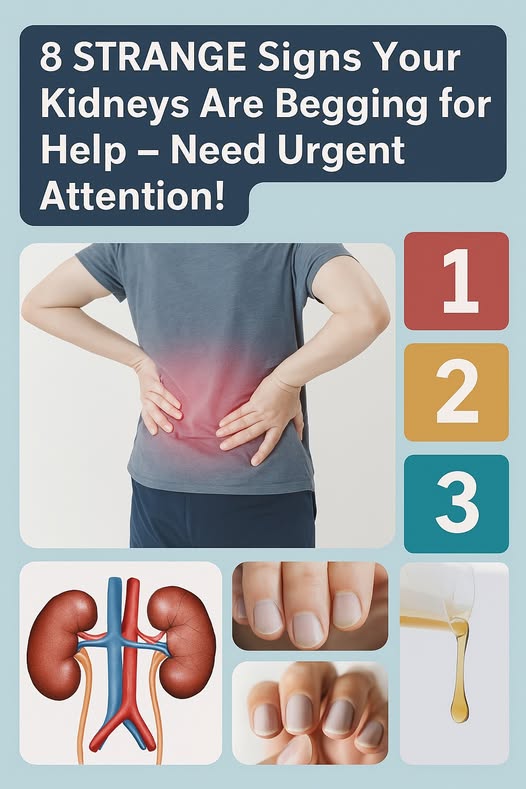Introduction

Your kidneys play a vital role in maintaining your body’s overall health by filtering waste, balancing electrolytes, and regulating blood pressure. However, kidney diseases often go unnoticed until they reach advanced stages. Many people ignore early symptoms, dismissing them as minor inconveniences. But doing so can lead to severe complications, including kidney failure.
If your kidneys are in trouble, your body will send warning signals. Ignoring these signs can be dangerous, but recognizing them early can save your health. In this article, we’ll highlight eight alarming signs your kidneys are begging for help and discuss what you should do to protect them.
1. Persistent Fatigue and Weakness
Do you often feel exhausted even after a good night’s sleep? Persistent fatigue is one of the earliest signs of kidney dysfunction. Why? Your kidneys help produce erythropoietin (EPO), a hormone responsible for red blood cell production. When kidney function declines, EPO levels drop, leading to anemia and chronic tiredness.
What to Do:
- Check your hemoglobin levels regularly.
- Increase iron-rich foods like spinach and lentils.
- Stay hydrated and avoid excessive caffeine.
2. Swelling in Your Hands, Feet, or Face
Unexplained swelling can be a red flag that your kidneys are not properly filtering excess fluids from your body. When the kidneys are struggling, fluid builds up, causing swelling, also known as edema.
What to Do:
- Reduce sodium intake.
- Keep your legs elevated when resting.
- Consult a doctor if swelling persists.
3. Changes in Urination Patterns
Your kidneys regulate urine production, so any significant changes in your urination habits could indicate trouble.
Warning Signs:
- Frequent urination, especially at night (nocturia).
- Foamy or bubbly urine, indicating protein leakage.
- Dark, tea-colored urine, a sign of possible blood contamination.
- Reduced urine output, signaling kidney inefficiency.
What to Do:
- Drink plenty of water.
- Monitor changes and consult a nephrologist if needed.
4. Persistent Lower Back Pain
Kidney pain often manifests as dull, aching pain on either side of the lower back. It can sometimes be confused with muscular pain or back problems.
Other Symptoms to Watch For:
- Pain that worsens when pressing the sides.
- Discomfort accompanied by fever and nausea (potential kidney infection).
- Pain that spreads to the groin (possible kidney stones).
What to Do:
- Stay hydrated to prevent kidney stones.
- Avoid overuse of painkillers (NSAIDs can harm kidneys).
- Seek medical attention for persistent pain.
5. Metallic Taste in the Mouth & Ammonia Breath
A buildup of waste products in your blood, known as uremia, can alter your taste and cause bad breath. If your food starts to taste metallic or you frequently experience ammonia-like breath, your kidneys might be struggling to filter toxins.
What to Do:
- Maintain good oral hygiene.
- Reduce processed foods high in phosphorus.
- Increase fresh fruits and vegetables in your diet.
6. Unexplained Itching and Dry Skin
Chronic kidney disease (CKD) often leads to dry, itchy skin due to toxin buildup and mineral imbalances. Your kidneys help regulate phosphorus and calcium levels; when they fail, skin problems arise.
What to Do:
- Use fragrance-free moisturizers.
- Avoid hot showers that dry out the skin.
- Consult a dermatologist for persistent itching.
7. Shortness of Breath
If your kidneys fail to remove excess fluids, fluid can accumulate in the lungs, causing difficulty breathing. Additionally, kidney-induced anemia can reduce oxygen supply to tissues, making you feel breathless even after minor activities.
What to Do:
- Limit fluid intake if diagnosed with kidney disease.
- Check hemoglobin levels for anemia.
- Avoid smoking and alcohol consumption.
8. High Blood Pressure That Won’t Budge
Your kidneys help regulate blood pressure by balancing fluid levels and producing hormones. Damaged kidneys can lead to uncontrolled hypertension, which further worsens kidney function, creating a vicious cycle.
What to Do:
- Reduce salt and processed foods.
- Engage in regular exercise to improve circulation.
- Take prescribed medications as directed.
FAQs on Kidney Health
Q: What are the early symptoms of kidney disease?
A: Fatigue, swelling, changes in urination, and lower back pain are common early signs.
Q: Can kidney disease be reversed?
A: While chronic kidney disease cannot always be reversed, early intervention and lifestyle changes can slow its progression.
Q: How can I naturally protect my kidneys?
A: Stay hydrated, maintain a balanced diet, limit sodium and processed foods, and control blood sugar levels if diabetic.
Q: How often should I get my kidneys checked?
A: If you have diabetes, high blood pressure, or a family history of kidney disease, get tested at least once a year.
Conclusion
Your kidneys work tirelessly to keep you healthy, but they need care too. If you experience any of these eight alarming signs, don’t ignore them! Early detection can prevent severe kidney damage and improve your overall well-being.
Act Now! Schedule a kidney function test if you notice persistent symptoms. Simple lifestyle changes, such as staying hydrated, eating a balanced diet, and avoiding excessive sodium, can go a long way in protecting your kidney health.
Your kidneys are your body’s natural detoxifiers—give them the care they deserve!


